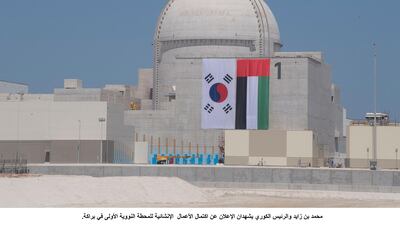The completion of the UAE’s first nuclear reactor is not only a milestone in the 46-year history of the Emirates – it is also the starting point for what could be a wider roll out of civilian nuclear energy in the Middle East.
Just as the UAE is looking to reduce its reliance on fossil fuels by building four reactors at its Barakah site, so Saudi Arabia, Egypt, Jordan and Turkey are aiming to develop programmes, while Iran is expanding its nuclear capacity.
In the Emirates, nuclear power is seen as necessary because rapid population growth has resulted in heavy increases in energy demand, much of it required to desalinate water. This has made the country more reliant on natural gas supplies from elsewhere in the Gulf.
Although the UAE has invested heavily in solar energy, by 2020 renewables will still account for less than 10 percent of the country’s energy requirements, while the four Barakah reactors will provide almost a quarter. As well as energy security, economic factors too have been at play, here and elsewhere in the Gulf.
“The main motives of Arab countries for pursuing the nuclear route are to provide additional and cleaner sources of energy supplies to meet rapidly growing domestic demand, and which in the case of the GCC will free some of the oil currently used for power generation for the more lucrative exports,” said Dr Carole Nakhle, founder and CEO of Crystol Energy and an associate lecturer in energy economics at the University of Surrey in the United Kingdom.
It was in April 2008 that the UAE government announced its intention to develop civilian nuclear power.
Demonstrating transparency, not to mention skilful confidence-building diplomacy with multiple nuclear technology exporting nations, the country worked closely with the International Atomic Energy Authority (IAEA) and forged multiple international nuclear cooperation deals. One of the most important was a 123 agreement with the US, signed in 2009, which confirmed that the UAE would not attempt nuclear enrichment or reprocessing.
“In terms of [nuclear] proliferation, the UAE have been clear they’re going for what they call the ‘gold standard’ of civilian nuclear programmes,” said Dr David Roberts, a Gulf region analyst at King’s College London.
In December 2009, the Emirates Nuclear Energy Corporation finalised a deal with a South Korean consortium led by Korean Electric Power Company for the four reactors at the Barakah site in the far west of Abu Dhabi emirate.
This week’s milestone means that it has taken less than a decade from the initial public announcement of a nuclear programme to the completion of the first reactor. Efforts by other Middle Eastern nations have typically seen their publicly announced timetables slip.
“The UAE is rather unique in terms of the speed with which the plant was built,” said Dr Nakhle.
“Not all nuclear power projects announced in the Middle East will materialise, especially in countries where funding is not readily available.
“In a region which is politically unstable, nuclear power will always raise concerns no matter how tight security and safety measures are.”
Some analysts have said the UAE’s transparency regarding its nuclear power programme is a “soft power” effort to encourage neighbours to follow a similar approach. By contrast, regional rival Iran, which has one operational nuclear power plant and others under construction, has faced ongoing international concerns over its nuclear activities.
Some observers have said, however, that the different geopolitical and economic circumstances of other nations in the region may make it hard for them to replicate the UAE’s example.
Among the Arab nations with nuclear ambitions is Jordan, which in November 2010 began constructing its $160 million (Dh588m) Jordan Research and Training Reactor (JRTR).
Produced in partnership with the Korean Atomic Energy Research Institute and Daewoo Engineering and Construction, the JRTR is focused on nuclear industry research and training, and the generation of medical isotopes. Completed within six years, this facility is already operational, although the energy it generates is released into the atmosphere.
Jordan hopes to use the reactor to train nuclear engineers for the Middle East as a whole, with experts saying that sourcing trained personnel is one of the key challenges facing the region’s civilian nuclear programmes.
“One issue is human resources … This is a problem the Gulf states have,” said Dr Roberts.
The Jordanian authorities hope to follow up the JRTR with fully fledged nuclear power plants.
Among other Arab nations, Saudi Arabia is, according to reports, set to award contracts in December for its initial two nuclear power plants, many years after the first agreements with nuclear technology exporters were signed. China, Russia, South Korea, the United States and France are hoping to secure the deal.
______________
Read more:
UAE and South Korea celebrate completion of Barakah's first nuclear reactor
______________
Like the UAE, Saudi Arabia is keen to reduce its reliance on fossil fuels, partly to free up supplies for exports.
“They need to find alternatives to renewables. I think the nuclear programme is seen as more practical,” said Dr Roberts.
Egypt, which has two nuclear research and training reactors, one supplied by the Soviet Union and the other by Argentina, has sparked some international concerns over its nuclear activity. In December, Egypt signed an agreement with Russia for the building of its first nuclear power plant, which will have four reactors, at Dabaa west of Cairo.
Meanwhile, next month Turkey will have a groundlaying ceremony for its first nuclear power plant, the Akkuyu facility, also a four-reactor plant built through a partnership with Russia. The Turkish president, Recep Tayyip Erdogan, and the Russian president, Vladimir Putin, are due to attend the showcase event.


